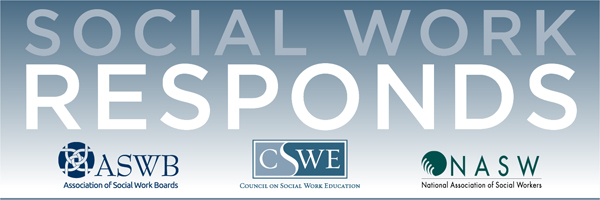Published on : July 30, 2021

The Association of Social Work Boards, the Council on Social Work Education (CSWE), and the National Association of Social Workers (NASW) are committed to collaborating on the range of issues affecting the social work profession and the people and communities we serve. In 2021, Social Work Responds will be issued quarterly.
The COVID-19 pandemic continues to evolve, with cases surging due to the Delta variant in a population that has not yet reached herd immunity (which according to the Centers for Disease Control and Prevention will be achieved when 80% of the population is fully vaccinated). Many are wondering: What will the fall look like? Social workers are pondering a related question: What will practice look like? Educators are wondering: What will our learning environment look like? Regulators are asking: How will the regulatory landscape change? Although we celebrate the availability of multiple safe and highly effective vaccines, we recognize that “reopening” our society, and ongoing recovery, will take a different form than we may have anticipated.
Many of the public conversations center around reopening; however, as an essential workforce, social workers never really stopped working. Seemingly overnight, we reinvented our care models and classrooms and adapted to wholly virtual models, and our clients and students adapted with us. One of the unique facets of this crisis that is easily overlooked is that we, too, were affected. As helping professionals, we continued to deliver services in the context of a social safety net that was also in crisis. Major investments by the federal government such as the American Rescue Plan will go a long way toward restoring that safety net.
Evolving in tandem with the public health crisis is a deepening mental health crisis that has been dubbed COVID’s “fourth wave.” Lisa Carlson, the immediate past president of the American Public Health Association, has aptly pointed out, “We don't have a vaccine for our mental health like we do for our physical health" (Rogers, 2021). Students reported more mental health challenges last year compared to previous years, according to CSWE research, and more than half of educators reported that colleagues dealt with more mental health challenges.
Whether in person or virtually, addressing the fourth wave will be front and center for many of us, whether we practice in schools, programs, health-care facilities, child welfare settings, or private practice. CSWE and NASW stand ready to support social workers, students, and educators as they bring their valuable expertise to bear in meeting the challenges of this moment.
Regardless of delivery methods or location, social work practice is regulated, and social workers must follow the regulations of the state. As governors issued emergency orders (EOs) authorizing electronic practice modalities and temporary licensing of social workers to address mental health needs of their constituents, regulators figured out how to implement the EOs while protecting the consuming public. Many social workers outside state lines were able to practice in-state under EOs; as those begin to expire, the previously existing laws and regulations will resume.
As EOs expire, regulators (and licensees) face new challenges to ensure practicing licensees meet jurisdictional requirements. In many cases the EOs are expiring without a transition period. Continuity of care and continuity of billing are two concerns arising from this “hard stop” ending of COVID-related licensing and practice flexibilities. The best advice for social workers practicing under EO provisions in a jurisdiction where they don’t hold a full license: Check with the regulatory board about next steps.
Yet for all of the challenges facing social work as we battle pandemic variants and work to reopen our schools and communities, there is encouraging news to share. People want to become social workers.
Enrollment is up more than 1% at accredited social work programs for fall 2021, according to CSWE research. Even during the pandemic, despite a nationwide 4.2% dip in postsecondary enrollment in 2020 (National Student Clearinghouse, 2021), enrollment increased at social work baccalaureate, master's, and doctoral programs.
We wrote last year that the country "will eventually emerge from the shadow of COVID-19, and social workers will pivot again, quietly providing the vitally important services, advocacy, and leadership needed for a recovery that benefits people from every community... This is who we are."
After we reopen and adjust to another "new normal," it is encouraging to know this is who we will continue to be.
References
Rogers, K. (2021). Mental health is one of the biggest pandemic issues we'll face in 2021. CNN Health. https://www.cnn.com/2021/01/04/health/mental-health-during-covid-19-2021-stress-wellness/index.html
National Student Clearinghouse Research Center. (2021). COVID 19: Stay informed with the latest enrollment information. https://nscresearchcenter.org/stay-informed/

